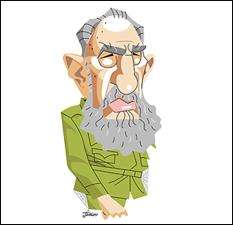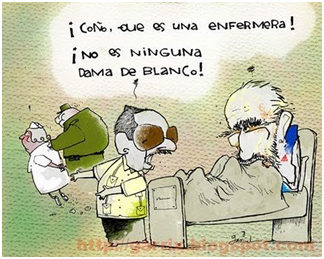 Minister of Finances and Prices
Minister of Finances and Prices
In July 2009, The Minister of Finances and Prices, a member of the Council of Ministers, ordered the confiscation of property obtained by Teófilo Roberto, the father of Antonio Roberto, during the period from 1998 to 2008. The action was taken under the authority of Decree-Law 149 (“Regarding the seizure of property and income resulting from unjust enrichment”) known as the law against profiteers (the new rich), and its regulations, Decree No. 187, both from 1994.
The minister claimed that the seized items “are not fruits of honest labor,” but the Cuban Civil Code defines unjust enrichment as the transfer of items of value from one estate to another, without a legitimate basis.
The process also affected Pompilio López Licor, age 61, and Teófila Elsa Ávila Gutiérrez, 60, Teófilo’s brother and his wife, who along with his son Antonio, were named in a ministerial order as third parties who benefited from the unjust enrichment.
The defendants appealed against the ministerial decision through the Recourse of Reform before the same minister, who declared it without merit, confirming his decision, in October 2009. On June 22nd they appealed again to the head of Finances and Prices, the start of a special review procedure.
But the appeals do not stay the execution of the penalty of confiscation. Decree-Law 149 placed those affected in a state of helplessness, preventing them from access to the courts to demand justice against an act of the government that is harmful, according to Article 9 of the Decree.
Pedraza Rodríguez asserts that the three houses, two cars, a motorcycle and various items, including appliances, were obtained and authenticated by Theophilus, and hidden through subterfuge, on behalf of his relatives, without specifying which acts were illegal.
But he did not initiate legal action against the state officials who acted to legalize the goods and property of those affected. In particular the Arroyo Naranjo municipal housing management officials, responsible for implementing the Ministerial Regulation concerning real estate. On July 22, the state agency notified Antonio that he would be evicted within 72 hours.
The confiscation process was initiated and submitted to the Minister by Brigadier General Juan Escalona Reguera, subsequently released from his position as Attorney General of the Republic by the State Council, who may be linked to a corruption scandal involving foreign companies.
The assets seized from the Lopez family amounted to 2,347,834.24 Cuban pesos. The amount was certified by experts who did not specify, as is required by law, what their evaluaiton consisted of, or what the parameters of the process were, or what factors they took into account to estimate that figure.
Teófilo, Antonio’s father, is self-employed as a “producer-vendor of food and nonalcoholic beverages in a fixed point of sale,” according to the rules for the activity numbered 646. In his defense he claimed that he received income from his self-employment amounting to 521,000 pesos. But the minister countered that Theophilus hired labor.
The criminal law regards the use of non-family labor in otherwise authorized activities as illegal. But the ministerial decision issued by the head of Finances and Price did not refer to any criminal penalty imposed on the father of Antonio.
Teófilo receives remittances from the United States from six brothers and a son who live in that country. From January 2007 to December 2008, the National Bank of Cuba established that the relatives of the accused deposited remittances for him of 12,000 convertible pesos (CUC), equivalent to 300,000 Cuban pesos (CUP). The bank report was dismissed by Minister Pedraza Rodriguez, because it did not show that Theophilus had actually received the money.
Article 60 of the Constitution of the Republic states that “the confiscation of property shall be used as a punishment by the authorities only in the cases and procedures determined by law.” The Penal Code, regulates it as a specific penalty and accessory of a crime.
The Constitution, The Law of Criminal Procedure, and the Ordinance of the People’s Courts, guarantee that “No one can be tried or sentenced except by a competent court under the laws in effect prior to the crime and with the formalities and guarantees that they provide.”
In this case, the Decree-Law 149 is unconstitutional and illegal because it provides that the penalty of confiscation be implemented by an administrative authority, as an exemplary measure against those who obtained an illegitimate legacy as a result of theft, speculation, diversion of resources from state agencies, involvement in shady deals, black market activities and other forms of enrichment.
In the same provision of law, the behaviors are classified as “criminal activities” that damage the national economy and social stability. But the prosecutor, who is responsible for bringing criminal actions on behalf of the state, decided to encourage an administrative proceeding before initiating a criminal complaint.
In a fair criminal trial, Theophilus’s relatives would never have had to answer for the acts of others. The responsibility is individual. Moreover, the Penal Code, in force since 1987, provides that “the confiscation of property does not include . . . goods or items that are essential to meet the vital needs of the sanctioned or the relatives of his household.” Thus, housing cannot be seized.
The preferred implementation of Decree-Law 149 is the result of the subordination of the Attorney General’s Office to the State Council. This means that it must first comply with political instructions before it controls and preserves “socialist legality” and ensure strict compliance of laws
The existence of this rule in the Cuban legal system far from protecting the general welfare, destroys the trust and security that any legal system must provide. Its application violates the guarantees afforded to criminal defendants and renders citizens defenseless against the excesses of the government.
Lina Olinda Pedraza Rodríguez was appointed by the government as Minister of Finance and Prices, but is not qualified to administer justice. The powers conferred by Decree Law 149/94 are unconstitutional, and therefore arbitrary.
Since July 22nd, Antonio López Ávila and his family members have lived with the apprehension that at any moment police officers will forcibly evict them and destroy their home.
Laritza Diversent
Photo: Minister Pedraza Rodriguez is also a member of the Communist Party Central Committee, and Deputy for the Province of Villa Clara.
Translated by: Tomás A.
August 11, 2010

 As August progresses, as if the summer sun and rain weren’t enough, the official press is punishing us with news that tests the boundaries of even the complete joke represented by the newspaper Granma, the Communist Party organ, and Juventud Rebelde — Rebel Youth — the newspaper for the younger generation, two sides of the totalitarian coin, accustomed to embellishing statistics, interviewing “leaders” and courtesans, pointing their magnifying glass at events in the United States and giving a pat on the back to allies like Iran and North Korea.
As August progresses, as if the summer sun and rain weren’t enough, the official press is punishing us with news that tests the boundaries of even the complete joke represented by the newspaper Granma, the Communist Party organ, and Juventud Rebelde — Rebel Youth — the newspaper for the younger generation, two sides of the totalitarian coin, accustomed to embellishing statistics, interviewing “leaders” and courtesans, pointing their magnifying glass at events in the United States and giving a pat on the back to allies like Iran and North Korea.

 Minister of Finances and Prices
Minister of Finances and Prices Fidel Castro in Parliament, for the first time in four years
Fidel Castro in Parliament, for the first time in four years
